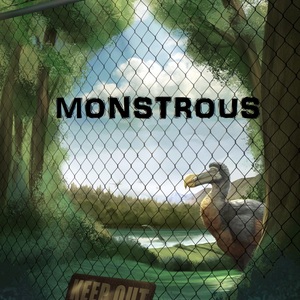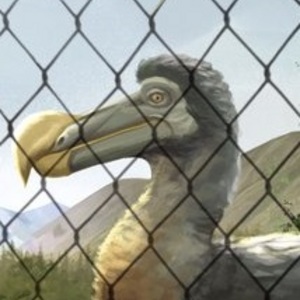THUNDERBIRD
by David Wellington
As they rushed across the water, the rocks grew ever larger, ever nearer. They were jagged and dark and made rough by the shells of tiny sea creatures, and there was no doubt in Baird’s mind that he and his handyman were about to die.
“Lord in Heaven!” Baird shouted, and grabbed at his leather helmet. The helmet was securely fastened on by a chin strap. He wasn’t worried about losing the helmet. The rocks rushed toward them with terrific speed and then—and then—
The floats of the little seaplane hissed as water poured away from them, then the engine roared and they were aloft. Baird looked down and saw the rocks pass right beneath them, looking so close he could all but touch them.
The wind tore at Baird’s clothes and the engine spat oil but they were climbing, reaching ever higher for the overcast sky. As the plane dipped its wing to the side and began to bank around, heading north, Baird saw that there was nothing around them at all, nothing holding them up. He had never flown before and this was, in fact, the first aeroplane he’d ever seen outside of a newspaper photograph. He had assumed the experience of flight would be terrifying, and he had braced himself for that.
What he hadn’t expected was the thrill of it. The exhilaration. He was flying, like in a dream. Like a bird! His heart soared and his mind reeled. He swiveled around in his seat to look back at Mr. Rutherford in the aft cockpit, wondering if his oldest companion and assistant was feeling these same wonderful feelings.
Mr. Rutherford, instead, seemed busy with the work of keeping the plane in the air. His head lowered as he studied his controls, then flicked upward and around as he looked to the vibrating wooden fuselage, the shuddering wings made of canvas stretched over a wooden skeleton, the countless thrumming cables and wires that held the whole thing together.
“We’re losing oil pressure,” Rutherford shouted, his words almost torn away by the wind. “If that continues we will end up in the drink, m’laird.” The handyman chewed on his bare lip, then reached out with a leather-bound fist and thumped his instrument console. “Ach, there it is, sir. Just a faulty reading.”
Baird felt, for a moment, a certain sadness that his dear friend couldn’t share this moment of jubilation. Then a gust of wind caught the plane and gave them a nasty thump that made Baird feel like he was going to be thrown out of the tiny cockpit. Panic gripped his soul, momentarily.
Probably for the best that Rutherford was keeping his mind on the business of flying. Best for both of them.
It was three days before they even caught sight of their quarry. Three days out on the water, flying so low some times they skimmed the waves, sometimes so high they rose above the clouds and the entire world went away, terra firma replaced by an endless expanse of wool made dazzling by the sun. At the end of each day their faces below their goggles were smeared with engine oil, their lips chapped by the wind, their hands like frozen claws. And yet Baird could not remember a time he felt more free, or more alive.
Yet they were here for a reason, and on the third day—they saw it.
In the distance a vast, dark anvil shape amassed above the waters, a brumous clot of darkness shot through with veins of lightning. The storm moved listlessly above the ocean like a man climbing into a bathtub on a wintry morning, picking at the waves with long fingers of mist. They stuck to the clear air well away from it, yet Baird knew that this was the time, and the place, and he wasn’t wrong. It appeared as just a speck of black at first, a piece of debris cast into the air by the storm. He urged Rutherford to get closer—close as he dared to the threatening clouds—and soon he could make out finer detail. It was a bird, a raptor by the look of its hooked beak and its long, straight wings. It did not flap those strong appendages, instead it merely held them outstretched and soared on the violent winds of the storm.
As Baird watched, the bird seemed oblivious to the aeroplane, still perhaps a mile off. It tilted its head to the side and studied the wrinkled surface of the water as if it were reading a particularly troublesome bit of text in an old academic journal. Baird could almost see the long feathers on its triangular head flapping in the wind. Then, without warning, it snapped its wings shut, drawing them close in to its body, and plummeted toward the water in what seemed a suicidal fit of abandon. Down, down it fell, gaining speed at an alarming rate, its wicked beak foremost. Only at the last possible second did it open its wings once more, filling them with air like vast parachutes and arresting its dive so that its talons merely kissed the ocean. Those cruel claws snatched shut and the bird powered back into the upper air on long, slow strokes of its wings, and now in its clutch was a long, wriggling fish, its silver scales catching the lightning and dazzling Baird’s eyes.
“The game,” Baird said, mostly to himself as the noise of the engine swallowed his words, “is—”
Yet he had no chance to finish his thought, as just then the plane juddered wildly and almost slewed over onto its side. Baird heard Mr. Rutherford cursing behind him as the pilot attempted to master the controls. Somehow he kept them from crashing, but he didn’t seem as happy about it as one might expect.
“‘Tis the weather, sir,” Rutherford growled. “Keeping this crate up is hard enough in good conditions. I’ll try to compensate for the wind.”
“Do your best, man—and get us closer!” Baird took a pair of binoculars out from inside his heavy coat and tried to lift them to his eyes. They clinked against his goggles and he had to reach up to remove the protective eyewear, at which point the plane jumped again and the binoculars went flying. Or, rather, plummeting.
“Blast,” Baird said. Yet if he wanted a better view of the creature, he was to get it soon enough. Following his orders, Rutherford took them ever closer to the looming storm, until half the sky was dark as night, while clear blue showed behind.
A titanic stroke of lightning smote the air. The entire plane shook and Baird was suddenly glad that his hands were free, because it meant he could use them to hold on.
The bird was nowhere to be seen.
“What manner of wingspan do you reckon that had?” Baird asked. “Three yards? Four, perhaps?”
It would be a rather ignominious end to their adventure if it turned out they had flown to their deaths just for one quick glimpse of a common eagle or hawk.
“Hard to say, m’laird,” Rutherford called back. “Perhaps—”
Out of the darkness, a new shadow swept over them. There was a sound of flapping wings that could have been mistaken for a thunder stroke, and a shape like triangular death slashed through the air close enough to trim Baird’s mustache. Or so it felt.
“Dear Lord, it’s the thunderbird! There can be no question!” Baird said.
The creature that the original inhabitants of America had venerated as a guardian spirit, the defender who cast bolts of lightning from its talons to keep the forces of the underworld in their place. The bird that naturalists had spotted—rarely—while exploring the American West, always, always wheeling on the edge of a storm.
Baird and Rutherford had crossed half the planet to find it.
“Sir,” Rutherford said.
“No time for congratulations as of yet!” Baird exclaimed. “Let’s bag it, first.”
It was only a matter of time before some big game hunter or a rich collector of curiosities came out this way. The rumors and legends all pointed this same direction, toward the Pacific Coast. Baird hadn’t come here looking for a trophy head to mount on a wall, however. He wanted to preserve the creature, to give it a good home in a place where it would be safe.
Some days his work was easier than others.
“Sir,” Rutherford said again. “Sir. If I may.”
“Get us closer, old man! As close as we dare!”
“Certainly, sir. But I only wished to point out—the beastie’s right there.”
Baird looked up to see a magnificent spread of wings. A whole serried rank of pinions, a phalanx of pin feathers. Then he looked up further and saw the magnificent head of the animal, its black beak the exact color of the heart of the thunderhead.
Without warning that beak flashed downward like a scimitar. The thunderbird twisted its head sideways and tore straight through the canvas wing of the biplane. There was a terrible sound of rent, flapping canvas and the entire plane twisted sideways in the sky, spinning out even as the bird brought up talons that could have carried off a full grown man.
Then it drew back, as if to observe the fruit of its labors.
For a moment, Baird thought the animal had broken off its attack and climbed for clearer air above them. Then he realized that the thunderbird was not climbing, but they were falling. Rather precipitously.
“We cannae fly with the one wing,” Rutherford shouted, his rural Scots upbringing coming out in the heat of the moment. “Sir! Brace yourself! We’re goin’ doon!”
It turned out that the seaplane had one great advantage over a more traditional “landplane”. Water was softer than solid ground.
They landed—or rather, they came to a stop on the surface of the waves. There was a certain jarring impact, and a great deal of splashing. The plane’s wings wobbled up and down very alarmingly, but only for a split second. After that they simply snapped in half and broke away from the fuselage, floating away on the churning water. The plane was never going to fly again, that much was abundantly clear.
As for its occupants—Baird blinked several times, then touched each of his arms and each of his legs, to assure himself they were still attached. This accomplished, he released his safety harness and twisted around in his cockpit. He looked back and saw a sight that filled him with dread. His handyman’s cockpit looked empty, untenanted. “Rutherford!” he called. “Mr. Rutherford! Are you alive, man? Were you thrown clear?” The man was unlikely to survive long in the frigid water.











Comments (0)
See all